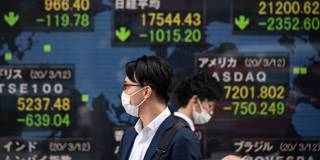With inflation on the rise and the era of ultra-low interest rates over, financial markets will face a huge stress test in 2023. While banking systems are more robust than they were in 2008, a real-estate slump could severely affect heavily leveraged private-equity firms, producing a systemic crisis.
CAMBRIDGE – The fact that the world did not experience a systemic financial crisis in 2022 is a minor miracle, given the surge in inflation and interest rates, not to mention a massive increase in geopolitical risk. But with public and private debt having risen to record levels during the now-bygone era of ultra-low interest rates, and recession risks high, the global financial system faces a huge stress test. A crisis in an advanced economy – for example, Japan or Italy – would be difficult to contain.
True, tighter regulation has reduced risks to the core banking sectors, but that has only led to risks shifting elsewhere in the financial system. Rising interest rates, for example, have put huge pressure on private-equity firms that borrowed heavily to buy up property. Now, with housing and commercial real estate on the cusp of a sharp, sustained drop, some of those firms will most likely go bust.
In that case, the core banks that provided much of the funding for private equity real-estate purchases could be on the hook. That has not happened yet, partly because lightly regulated firms are under less pressure to mark their books to market. But suppose interest rates remain stubbornly high even during a recession (a distinct possibility as we exit the ultra-low-rate era). In that case, widespread payment delinquencies could make it hard to maintain appearances.

CAMBRIDGE – The fact that the world did not experience a systemic financial crisis in 2022 is a minor miracle, given the surge in inflation and interest rates, not to mention a massive increase in geopolitical risk. But with public and private debt having risen to record levels during the now-bygone era of ultra-low interest rates, and recession risks high, the global financial system faces a huge stress test. A crisis in an advanced economy – for example, Japan or Italy – would be difficult to contain.
True, tighter regulation has reduced risks to the core banking sectors, but that has only led to risks shifting elsewhere in the financial system. Rising interest rates, for example, have put huge pressure on private-equity firms that borrowed heavily to buy up property. Now, with housing and commercial real estate on the cusp of a sharp, sustained drop, some of those firms will most likely go bust.
In that case, the core banks that provided much of the funding for private equity real-estate purchases could be on the hook. That has not happened yet, partly because lightly regulated firms are under less pressure to mark their books to market. But suppose interest rates remain stubbornly high even during a recession (a distinct possibility as we exit the ultra-low-rate era). In that case, widespread payment delinquencies could make it hard to maintain appearances.